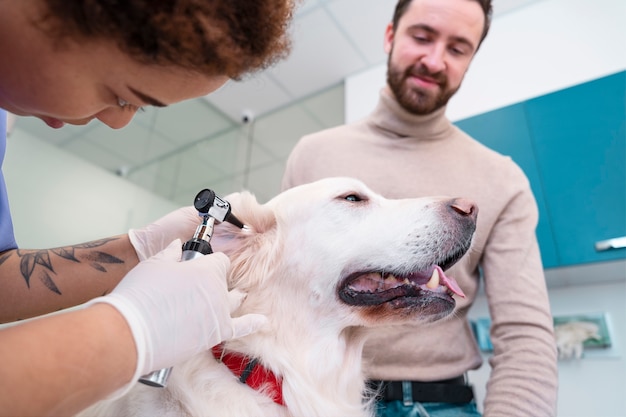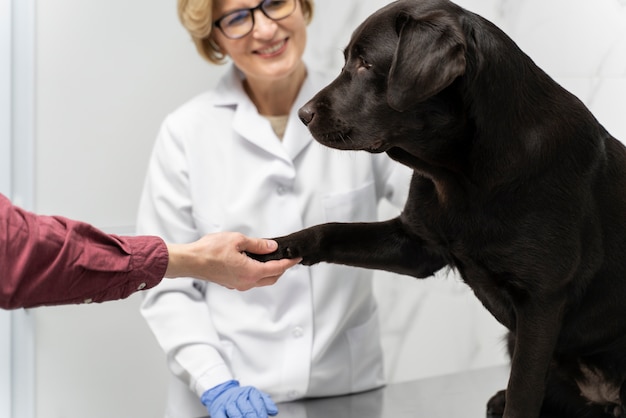Why Are Regular Wellness Exams Essential for Your Pet's Health?


As a pet owner, you want to ensure your furry friend lives a happy, healthy, and fulfilling life. One of the most crucial steps in achieving this goal is to schedule regular wellness exams for your pet. These comprehensive check-ups go far beyond just addressing immediate health concerns, they are the foundation for preventive care and long-term well-being.
What is a Pet Wellness Exam?
A pet wellness exam is a comprehensive, routine check-up conducted by a licensed veterinarian. Unlike a sick visit, where the focus is on addressing a specific health concern, a wellness exam is designed to assess your pet's overall physical and mental well-being. These examinations provide your veterinarian with a snapshot of your pet's current health status, allowing them to identify any potential issues early on and develop a proactive plan to maintain your pet's optimal health.
Key Components of a Pet Wellness Exam
During a pet wellness exam, your veterinarian will perform a thorough physical examination, covering a wide range of areas to ensure your pet's health. Some of the key components of a wellness exam include:
- Physical Examination: Your veterinarian will conduct a head-to-toe assessment, checking your pet's eyes, ears, mouth, skin, coat, and overall body condition.
- Vital Signs: They will measure your pet's temperature, heart rate, respiratory rate, and blood pressure to ensure these vital signs are within the normal range.
- Diagnostic Tests: Depending on your pet's age, breed, and overall health status, your veterinarian may recommend various diagnostic tests, such as blood work, fecal analysis, or imaging scans.
- Parasite Screening and Prevention: Your veterinarian will assess your pet for the presence of internal and external parasites, such as fleas, ticks, and worms, and provide appropriate preventive treatments.
- Dental Evaluation: Your veterinarian will examine your pet's teeth and gums, checking for any signs of dental disease or other oral health issues.
- Behavior and Nutrition Assessment: Your veterinarian will discuss your pet's behavior, activity levels, and dietary needs to ensure they are thriving both physically and mentally.
- Vaccine and Medication Review: Your veterinarian will review your pet's vaccination history and current medications, making any necessary updates or adjustments.
By addressing these key components, your veterinarian can gain a comprehensive understanding of your pet's overall health and develop a tailored plan to maintain or improve their well-being.
The Importance of Regular Wellness Exams for Preventive Pet Health
Regular wellness exams are essential for your pet's health for several reasons. Wellness exams allow your veterinarian to identify potential health issues in their early stages, when they are often more treatable and less costly to manage. This proactive approach can help prevent or minimize the severity of many common pet health problems.
Wellness exams provide an opportunity for your veterinarian to recommend and administer preventive treatments, such as vaccinations, parasite control, and dental cleanings, which can significantly reduce the risk of your pet developing serious health conditions.
Each pet is unique, and regular wellness exams allow your veterinarian to develop a personalized healthcare plan that addresses your pet's specific needs based on their age, breed, and lifestyle. Wellness exams include an assessment of your pet's behavior and nutritional needs, enabling your veterinarian to provide valuable guidance to ensure your pet's overall well-being.
By staying on top of your pet's health through regular wellness exams, you can have the peace of mind knowing that your pet is receiving the best possible care and is less likely to experience unexpected health crises.
How Often Should You Schedule a Pet Wellness Exam?
The frequency of your pet's wellness exams will depend on their age and overall health status. Here are the general guidelines:
- Puppies and Kittens: Puppies and kittens should have a series of wellness exams every 3-4 weeks until they reach 16 weeks of age, followed by an annual exam.
- Adult Pets: Adult pets (1-7 years old) should have an annual wellness exam.
- Senior Pets: Pets 7 years and older should have a wellness exam every 6-12 months, as they are more susceptible to age-related health conditions.
Your veterinarian may recommend more frequent wellness exams if your pet has a specific health condition or is at a higher risk for certain diseases based on their breed, lifestyle, or other factors.
Schedule Your Pet’s Wellness Exam with Merrill Animal Clinic Today
Investing in your pet's health through regular wellness exams is one of the most important steps you can take as a responsible pet owner. These comprehensive check-ups provide your veterinarian with the opportunity to proactively address your pet's health needs, detect and prevent potential issues, and ensure your furry friend lives a long, healthy, and happy life.
At Merrill Animal Clinic, we are dedicated to providing exceptional veterinary care for pets of all ages. Our experienced veterinarians and caring staff are committed to working closely with you to develop a customized wellness plan that meets the unique needs of your pet. Visit our office in Jacksonville, Florida, or call (904) 552-3551 to schedule your pet's next wellness exam and take the first step towards a healthier, happier future.




















